MicroBrewr 082: Gluten free beer for a large market
Podcast: Play in new window | Download | Embed
Subscribe: RSS
Brian Kovalchuck has a background in finance and marketing and came to beer late in his career. After he helped with the turnaround of Pabst Blue Ribbon, Brian became CEO of the gluten free Bard’s Tale Beer Company in Minneapolis, Minnesota.
“I wish I had been in the beer business a long time. It’s a great business to be in.” [Tweet This]
In the U.S. there are approximately 2 million people with Celiac Disease, an autoimmune disorder that causes damage to the intestine from eating gluten. There are approximately another 6 times that number of people who are gluten-intolerant or voluntarily exclude gluten from their diet.
“Gluten is a protein found in most common grains,” explains Brian, “wheat, rye, barley, and sometimes oats gets thrown into that because of cross-contamination.”
The founders or Bard’s Tale Beer Company experimented for 2 years before they settled on a recipe and a method. Their secret is malted sorghum. Sorghum is a grain that does not have gluten. It is commonly used to make gluten-free beers, but it is not commonly malted like other grains used in brewing.
Bard’s is the only brewery that uses malted sorghum to brew gluten free beer. Brian won’t say whether Bard’s malts their own sorghum or has it made for them, but he did say it’s their own.
Bard’s uses a contract brewer to make “Bard’s Gold,” currently their only product.
Brian’s advice for finding a contract brewer is use a brewer that:
- Has a good reputation
- Makes high-quality products
- Has a lab that can ensure consistency
- Is happy to work with you
- Has the capacity to grow with you
Other contract breweries—or breweries that got their start as a contract brewery—on MicroBrewr Podcast:
If you’re using a contract brewer to make gluten-free beer, you’ll need to take special care to ensure there is no cross-contamination from the other beers brewed at the facility. Bard’s beer is always the first batch brewed after the brewery is cleaned. They test at several points along the process to ensure there is no gluten in the beer.
“The gluten free market around your brewery is too small to support a brewery,” says Brian. “There’s just not enough gluten-intolerant people to support a stand-alone gluten free brewery in one location.”
So Bard’s model depends on very wide distribution. And working with distributors can be tricky.
“The way the laws are written,” says Brian, “once a distributor gets a beer brand, it’s very difficult to get that beer brand back from the distributor. So if you make a mistake, it’s really hard to fix that problem.”
Brian’s tips for picking a distributor:
- Talk to contacts you already know.
- Differentiate yourself from the others.
- Work with the distributor to drive the business.
- Find a distributor that is eager to work with you.
- Coordinate marketing across all 3 tiers.
Brewery specs:
Kettle size: 500-BBL batches.
Size and quantity of fermentation tanks:
Size and quantity of bright tanks:
Annual brewing capacity/last year’s production:
Square footage:
Years in operation: 9 years (opened 2006).
Listener question:
From Melissa Bess Reed: How do I make quality gluten-free beer that always has the same delicious flavor profile that I can count on?
Can’t-go-without tool:
The Brewmaster.
Book recommendation:
- Education tab on the Brewers Association website.
Check out the entire list of recommended books, click here.
An upcoming beer style:
Session beer
Other resources:
- Pabst Calls It a Comeback, Emily Patti, Shepherd Express, April 20, 2010.
- MicroBrewr 038: Learn the classics and stay true to your genre, MicroBrewr, December 2, 2014.
- Draft Top, turning beer cans into pint glasses.
- Brewers Association, promoting Independent Craft Brewers.
You can reach Brian Kovalchuck and Bard’s Tale Beer Company at:
Sponsors:
Support MicroBrewr
Help keep MicroBrewr on the air. CLICK HERE for ways you can help.

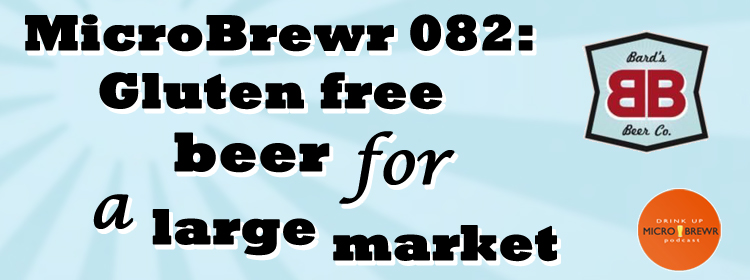




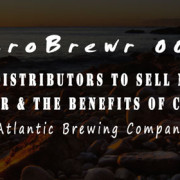
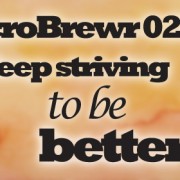
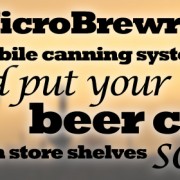


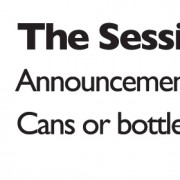



There are other options for gluten-free beer emerging.
http://www.craftbrewingbusiness.com/ingredients-supplies/shorts-brewing-goes-gluten-free-space-rock/
Thanks for sharing Ken!
Here’s another: Last year, Alpine Beer Company went all gluten-free. This article explains more and mentions that they can’t get all gluten out of the beer. Maybe Short’s is using other technology.
If I experienced what my friend with celiac’s disease did, I’d be cautious about consuming anything that once had gluten… http://beerpulse.com/2014/02/alpine-beer-company-goes-gluten-less-with-its-beers-2523/
I suspect Alpine is using the same thing Short’s is since they referenced the “enzyme” in the article. I have been using it in my last few homebrew batches as well, and am curious to get it tested.
P.S. For more on Short’s Brewing, check them out on MicroBrewr Podcast 052: https://microbrewr.com/share-your-brewerys-story-with-podcast/